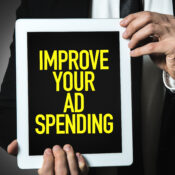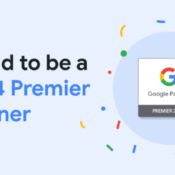/
Pay Per Click Plight: The Ballad of Over-Emphasizing Ad Position
 Aside: If you have not seen the movie “Talladega Nights or you do not know who Ricky Bobby is, you will probably have a hard time enjoying the subtle humor littered throughout this post; I apologize.
Fueled by the drive to attain web traffic, engagement, sales, leads, etc., many businesses (and marketers) erroneously focus their entire PPC effort on securing the number one Ad Position in Search Results pages for all of their Campaign Keywords and text Ads. Sure, holding the top Sponsored Listing in Google and/or Bing may (as in might, could, possibly will, or possibly will not) boost the number of absolute Clicks to, and Conversions on, your website. However, for the sake of maximizing the relevancy—as measured by Click Thru Rate and Conversion Rate—as well as the profitability of your Paid Search program, optimizing for Ad Position is the wrong way to “Shake and Bake,” as good ol’ Ricky Bobby would say.
Now, I know what you are thinking: “Andrew, I operate in a cut-throat industry. I need elicit, top of mind coverage with my potential/actual customers, and I need to drown out the messaging of my competitors. Why wouldn’t I want my text Ads at the top of Google Search Results pages?” My response: You are certainly correct about the necessity of affixing your brand at the forefront of the market while setting yourself apart from the competition; I’m glad you “wanna go fast.” With that said, placing Ad Position at the crux of your PPC Campaign is not the ideal way of achieving that end. Let me provide you with a few easy-to-digest reasons as to why you shouldn’t get “all jacked up on Mountain Dew” over Ad Position:
Aside: If you have not seen the movie “Talladega Nights or you do not know who Ricky Bobby is, you will probably have a hard time enjoying the subtle humor littered throughout this post; I apologize.
Fueled by the drive to attain web traffic, engagement, sales, leads, etc., many businesses (and marketers) erroneously focus their entire PPC effort on securing the number one Ad Position in Search Results pages for all of their Campaign Keywords and text Ads. Sure, holding the top Sponsored Listing in Google and/or Bing may (as in might, could, possibly will, or possibly will not) boost the number of absolute Clicks to, and Conversions on, your website. However, for the sake of maximizing the relevancy—as measured by Click Thru Rate and Conversion Rate—as well as the profitability of your Paid Search program, optimizing for Ad Position is the wrong way to “Shake and Bake,” as good ol’ Ricky Bobby would say.
Now, I know what you are thinking: “Andrew, I operate in a cut-throat industry. I need elicit, top of mind coverage with my potential/actual customers, and I need to drown out the messaging of my competitors. Why wouldn’t I want my text Ads at the top of Google Search Results pages?” My response: You are certainly correct about the necessity of affixing your brand at the forefront of the market while setting yourself apart from the competition; I’m glad you “wanna go fast.” With that said, placing Ad Position at the crux of your PPC Campaign is not the ideal way of achieving that end. Let me provide you with a few easy-to-digest reasons as to why you shouldn’t get “all jacked up on Mountain Dew” over Ad Position:
- Optimizing for the number one Ad Position ain’t cheap. Even with a great Ad and a slew of high Quality Score Keywords, you will likely need to outbid every other organization vying for those same Keywords in order to maintain your coveted top spot (assuming that your competitors have the capacity to write a mediocre ad, at the very least). If you run an automotive dealership, doing so means putting your advertising dollars up against the likes of Ford, GM, Honda, Toyota, etc., who can afford to set high Keyword bids. Do you have that type of money laying around, Chip?
- Optimizing for the number one Ad Position may prevent you from accomplishing your online marketing objectives. Instead of worrying about Ad Position, concern yourself with the goals of your PPC Campaign. What are you trying to achieve? More relevant web traffic? More qualified phone calls and leads? Or, maybe you have specific targets for your Paid Search initiative involving an increased Click Thru Rate and Conversion Rate, or a more profitable overall Cost Per Click and Cost Per Conversion. Once you verify what you would like to accomplish with your Campaign(s), optimization should stem from the metrics that allow you to do so; with the right combination of Keywords, Ads, and Targeting, your “correct” Ad Position will fall into its rightful place. Abracadabra, homes.
- Even Google—the king of Search as we know it—will advise you to not get too caught up with Ad Position. Why? Not only does Google cite the increased bid requirement and subsequent Campaign cost for doing so, the Search Engine giant has also found that “Conversion Rates Don’t Vary Much with Ad Position.” More often than not, as long as you remain in one of the top 3 Ad slots, not necessarily the first, you can expect to attain the traffic and lead volume necessary to achieve your marketing goals and earn a positive return on your PPC investment.
Still don’t believe me, Cal? Let’s put what I’m saying into perspective by taking a peek at some data from one of our Automotive clients (If you’ve read any of my other posts, you should know by now that I’m a bit of a numbers guy). Within a month of starting their PPC Campaign with us, the Auto dealership’s owner instructed us to focus our efforts on attaining the top Ad Position on Search Results pages. Grudgingly, we obliged (the customer is always right, right?) and began our quest for the top. At the end of month 2, our client felt unsatisfied with his website’s traffic and lead volume (given his monthly budget), so we switched our game plan and optimized for relevant Clicks and Conversions in months 3 and 4. As you can see below, by ignoring Ad Position (for the most part), and by focusing on what matters, the Campaign saw healthy improvement, while actually dropping to Ad Slot 2 (and sometimes lower).
 Simply put, the Ad Position metric, while important to some extent (particularly in SEO), isn’t necessarily all “peaches and cream.” Basing your entire PPC initiative around attaining the top spot in Search Results pages will most likely lead to a quickly-emptied pocketbook; you probably will not have much to show for it either in terms of qualified leads and sales. Instead, earn the Ad Position you deserve with a relevant set of Keywords, Keyword Bids, Ads, and landing pages that drive clicks (web traffic) and Conversions (leads/calls/sales). Do that, and you’ll be the “Magic Man” (or Woman); your PPC Campaign will conquer the web as “El Diablo.”
*This is pure sarcasm; If you do in fact enjoy Nascar, I apologize.
Sources:
Simply put, the Ad Position metric, while important to some extent (particularly in SEO), isn’t necessarily all “peaches and cream.” Basing your entire PPC initiative around attaining the top spot in Search Results pages will most likely lead to a quickly-emptied pocketbook; you probably will not have much to show for it either in terms of qualified leads and sales. Instead, earn the Ad Position you deserve with a relevant set of Keywords, Keyword Bids, Ads, and landing pages that drive clicks (web traffic) and Conversions (leads/calls/sales). Do that, and you’ll be the “Magic Man” (or Woman); your PPC Campaign will conquer the web as “El Diablo.”
*This is pure sarcasm; If you do in fact enjoy Nascar, I apologize.
Sources:
- “Google cite” http://support.google.com/adwords/certification/bin/answer.py?hl=en&answer=2799821
- “Conversion Rates Don’t Vary Much with Ad Position.” http://adwords.blogspot.tw/2009/08/conversion-rates-dont-vary-much-with-ad.htm




